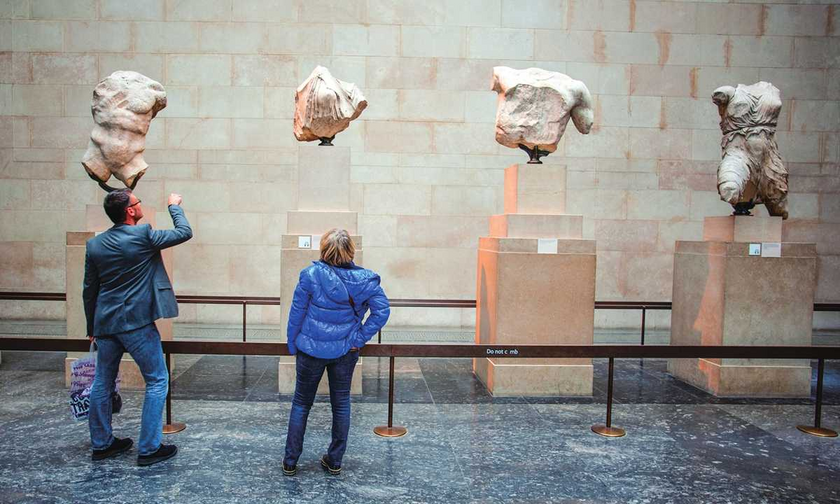Reunification of Parthenon Sculptures in Athens would send a powerful global message: Greek Culture Minister
By Dong Feng Published: Nov 19, 2025 11:02 PM
Editor's Note:
At the 43rd UNESCO General Conference, Greek Culture Minister Lina Mendoni (Mendoni) renewed Greece's longstanding call for the return of the Parthenon Marbles to Athens, urging UNESCO members to back what she called a "just and deeply symbolic cause." In an exclusive interview with the Global Times (GT) reporter Dong Feng, Mendoni emphasized that the international cultural communities need to shoulder the responsibilities of safeguarding shared human heritage, and noted they can contribute constructively to a just resolution that respects provenance, conservation, and access for global audiences.
GT: This is not the first time Greece has called for the return of the Parthenon Marbles. What has changed in the geopolitical, cultural, or public sentiment landscape that has renewed the urgency of this appeal?
Mendoni: Greece's request is longstanding, but the landscape around it has changed significantly in recent years. Across the world, governments, museums, and civil society now recognize the need to address historic wrongs in the handling of cultural heritage. Major institutions are returning artifacts acquired through dubious means, and the global conversation has shifted decisively toward restitution and ethical stewardship. In this context, since 2021, UNESCO has issued a series of strong, unanimous decisions acknowledging that the Greek claim for the restitution of the marbles is legitimate and rightful, and that the issue is of intergovernmental nature and not merely between museums.
As far as legal claims are concerned, recent research has confirmed that the document which was long cited to justify the removal of the Sculptures, never existed. Even representatives of the Turkish Ministry of Culture have acknowledged this publicly at UNESCO.
On the other hand, as opposed to the documented damage the Sculptures have suffered in the British Museum over the years, Greece has been carrying out exemplary and admirable work in the maintenance, restoration, and reconstruction of all the monuments of the Acropolis and has created the new Acropolis Museum, designed, built and equipped to the most modern standards in order to house the sculptures under the best possible conditions. This museum has now been operating extremely successfully for 16 years and is one of the most important, recognizable, popular, and visited museums in the world, cancelling the standing British argument that Greece did not have suitable and adequate facilities to house them.
Even in the UK, public sentiment has also changed. Recent polls show a clear and growing majority of Britons in favor of returning the Sculptures to Athens. At the same time, leading British political figures and cultural authorities, including the Administration of the British Museum, have expressed openness to dialogue.
The moral and legal arguments for reunification are now clearly stronger than ever. Taken together, these developments make the call for the restitution of the Parthenon sculptures more urgent, more justified, and more widely supported than at any time in the past.
At this point, I would like to thank China very much for its warm support on the issue of the return of the Marbles.
GT: Why are the Parthenon Marbles so important to Greece?
Mendoni: The significance of the Parthenon Marbles to Greece extends far beyond art history. To Greeks the Acropolis monuments and the Parthenon are constitutive and essential parts of their cultural, ethnic, and national identity. They are central focal points of collective memory and education. They are valued as emblematic achievements of Greek culture, and examples of the combined excellence in the arts, philosophy, and political theory that Greece has presented to the world. They constitute ecumenic representations of humanism and democracy, incorporating the values that have shaped European and Western culture and continue to inspire the international community.
The Parthenon is a UNESCO World Heritage Site recognized for its outstanding universal value. In this respect, the sculptures themselves are not standalone artworks. They are integral structural and narrative elements of the Parthenon, created to function as a unified architectural aesthetic and conceptual entity. They represent in art, what the Parthenon stands for in concept. Their symbolic character is inherent and intense. Removing them broke that unity and shattered the context that enables full understanding and interpretation, not just of the Parthenon, but of the Acropolis as a whole.
Through time, the Sculptures have come to signify the culmination and epitome of Greek civilization, as well as of modern Greek pride and self-esteem. Refusing their return and restitution is equivalent to negating Greek identity and dignity. Subsequently, reuniting the Sculptures in Athens is not only an act of cultural justice; it restores the integrity of a monument that belongs to humanity, allowing future generations to experience the Parthenon as a coherent work of genius, rather than a fragmented relic and spoil, a remnant of imperialism and colonialism.
GT: UNESCO has a unique mandate to protect world heritage. In what concrete ways do you see UNESCO facilitating a successful resolution - whether through mediation, repatriation frameworks, or international norms - and why is UNESCO the right platform for this dialogue?
Mendoni: UNESCO combines technical expertise, diplomatic credibility, and international legitimacy - an essential mix for resolving a dispute of this nature. Its mission transcends political boundaries, anchoring discussions in the universal value of heritage rather than in bilateral power dynamics. This makes UNESCO uniquely capable of fostering trust and ensuring transparency, and guiding parties toward sustainable, consensus-based solutions. Its Intergovernmental Committee for the Return of Cultural Property has repeatedly affirmed that the Parthenon Sculptures issue is a government-to-government matter, and it has urged the UK to enter good-faith negotiations with Greece.
UNESCO also provides several key mechanisms including mediation and good-offices procedures, offering a neutral forum for structured dialogue; established norms and precedents on cultural property that guide states toward solutions rooted in international law and ethical practice; a platform for accountability, ensuring that discussions remain transparent, constructive, and focused on the universal value of the monument rather than narrow institutional interests.
With multiple unanimous decisions since 2021, UNESCO has made its position clear. It stands ready to facilitate a fair and lasting resolution, and it remains the most appropriate body for supporting both parties in reaching one.
GT: What responsibilities do international scholarly, museum, and cultural communities bear in safeguarding shared human heritage, and how can they contribute to a just resolution that respects provenance, conservation, and access for global audiences?
Mendoni: These communities act as stewards of humanity's memory. Their responsibility goes beyond protecting objects. It includes protecting the integrity of the stories, identities, and relationships that those objects represent. In their respective capacities, they can contribute in concrete ways:
First, by conducting rigorous provenance research and making results public, including cases where acquisitions were unlawful, unethical, or rooted in colonial-era coercion. Second, by fostering collaborative scholarship, allowing researchers in countries of origin to participate fully in the study of their own heritage. Third, by supporting repatriation when justified, recognizing that ethical stewardship sometimes requires objects to return to their rightful cultural and historical setting. Fourth, by leveraging digital technologies to ensure global access even when artifacts are reunited with their original monuments or communities.
Ultimately, their role is not simply to guard collections but to strengthen trust, accountability, and cultural understanding across borders.
GT: If a pathway toward return were to be agreed upon, what would be the essential elements for a smooth, transparent, and enduring transfer, and what timelines or milestones should the international community anticipate?
Mendoni: Any agreement must begin with recognition of a fundamental truth: the Parthenon Sculptures form part of an indivisible monument. Their reunification is essential to restoring that integrity. Greece stands ready to engage constructively within the framework of its cultural heritage legislation. The Acropolis Museum was built to host the sculptures under optimal conditions. Their return would not leave empty halls in the British Museum. Greece has repeatedly stated that it is prepared to support the British Museum with long-term, rotating loans of important antiquities, ensuring continuous public engagement and meaningful cultural exchange. Culture should bring people together. The reunification of the sculptures in Athens would send a powerful global message: that restoring heritage is an act of mutual respect and shared humanity. The administrative details and logistics of such an endeavor would be significant, but within the experience and expertise of the two world-class organizations. Key elements of a successful pathway would include the establishment of a bilateral framework grounded in cultural diplomacy and supported by UNESCO mechanisms, legal arrangements that respect Greek law while addressing UK concerns, logistics including not just secure transport but also conservation planning. All these would be combined by common educational and exhibition initiatives that highlight the cooperation between the two countries and represent the coming of a new era not only in bilateral, but also in international cultural relations.
GT: How should the international audience engage with this issue?
Mendoni: Moving forward, the international audience should not rely on a single channel of engagement. On the contrary, the most constructive path would combine public diplomacy to build trust, scholarly collaboration to ground the debate in knowledge, and institutional advocacy to reform cultural practices. Unbiased, sincere and good-faith dialogue should form the basis of every exchange, and UNESCO's role as a facilitator and guarantor is crucial in this respect. Global civil society should also play a key role, as it has always been vividly engaged in displaying the bearings of the moral and emotional level.
https://www.globaltimes.cn/page/202511/1348618.shtml




















